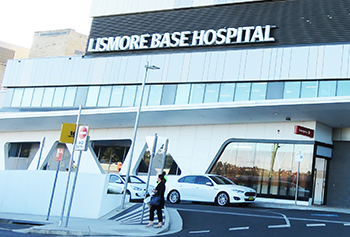
Editorial - 20/20 vision
I want it all, I want it all, I want it all, and I want it now
- Queen, 1989
Civilisation has come a long way in 5,000 years. The English philosopher Thomas Hobbes described the natural state of man as “solitary, poor, nasty, brutish and short”. He argued that this could be addressed by ceding one’s liberty to the Crown in exchange for an enjoyment of the benefits that society brings. An individual’s basic needs for food, shelter and clothing would thus be met.
Times have changed. More recently economists have argued that sanitation, education, healthcare and the internet be added to the list. That’s progress, but on the North Coast many of us will have patients living below the new poverty line.
- Details
- Written by: David Guest

Concerns over long waits for public gastro care
Notable delays for public patients requiring endoscopy, especially colonoscopy, procedures are set to become even longer following a decision by consultant gastroenterologist Howard Hope to discontinue accepting referrals for patients needing upper GI endoscopy or colonoscopy at Lismore Base Hospital (LBH).
In a letter of 9 February 2020 to local referring doctors and other relevant parties, a clearly exasperated Dr Hope said the “prime reason is the excessive waiting times for public endoscopy at LBH, especially for colonoscopy.”
He stated that he and colleagues had been discussing the long waiting times with LBH management for many years.
In December 2019 he asked LBH managers to create a public Outpatient Clinic for gastroscopy and colonoscopy referrals. Referral to this open access Outpatient Clinic would help reduce the delay from GP referral to the appropriate procedure.
He added “The fundamental problem is that endoscopy waiting times (compared with surgical waiting times) are not a reportable performance indicator for hospital managers. In my opinion this is a serious failure of the NSW Department of Health policy.”
- Details

Telehealth 2020
The Covid-19 pandemic has brought about the greatest dislocation to Australian society since World War 2. Changes to work and life are affecting all members of the community and have required wholesale changes to the way we do things.
Restricting exposure to each other has been the key to flattening the curve and Australia’s success has been amongst the best in the world. Unfortunately this has left many Australians out of work and some industries have been completely shut down. Nevertheless, many aspects of society need to keep functioning, not the least medical care.
As part of the national response to the Covid-19 pandemic, the Federal government has made extensive changes to the availability of telehealth. While physical examination is a basic element in clinical diagnosis much of our routine care can be accomplished without it.
- Details
- Written by: David Guest

Covid-19 Update from the North Coast Fever Clinic
Some GPs have recently had difficulties in coordinating care for suspected Covid-19 patients. Dr Brian Hughes of the LBH Fever Clinic provides a quick update for the current situation on the North Coast.
Criteria for being seen at the Covid-19 Clinic have changed rapidly over the last two weeks. The criteria as of 8 April 2020 are:
- Respiratory infection requiring admission
- Overseas travel past 14 days and respiratory symptoms
- Contact with case COVID-19 past 14 days
- Symptomatic HCW Worker (includes aged care workers and disability workers in residential facilities)
- Public health outbreak control (includes aged care facility residents, correctional centre inmates/staff, other institutions, suspect cases in remote Aboriginal communities- 2 or more cases) or as directed by PHU
- Essential services workers e.g. Police – symptomatic
- Contact with a Backpacker past 14 days -symptomatic
- Symptomatic- from or contact with Eastern Suburbs Sydney or Ryde past 14 days (other area defined by PHU – e.g. see below)
- Symptomatic from Port Macquarie or Byron Shires
- Backpackers symptomatic or asymptomatic
- Referrals from GPs (Please call if issues)
- Details
- Written by: Dr Brian Hughes – Fever Clinic
Read more: Covid-19 Update from the North Coast Fever Clinic

Paper Clips - not for everyone
Commissioning and contracting has been used extensively by the British and Australian governments for many years. In fact it goes back so many years that one could argue that Australia owes its existence, or at least its English heritage, to commissioning.
The initial wave of colonisation was financed through contractual arrangements for the First Fleet in 1787 and was followed over the next few years by the Second and Third Fleets with similar arrangements. The effectiveness of these arrangements was variable on some measures. The death rate of the prisoners on the Second Fleet was 40%.
Commissioning started to be used extensively in Britain following the election win in late 1979 by Margaret Thatcher’s Conservative government that had followed the “Winter of Discontent”, marked by widespread strikes under Labor.
Commissioning came to the fore in Australia under the NSW Greiner government in the late 80s and was led by the Premier’s Secretary, Gary Sturgess. Sturgess worked extensively in Britain in government and private practice in the 2000s before resigning his position as Executive Director of the Serco Institute in 2011 to return to Sydney, where he now holds the chair of Public Service Delivery at the Australian School of Business, University of New South Wales. He has, however, continued to work as an adviser in Britain, most recently in 2017, with his paper Just Another Paperclip.
- Details
- Written by: David Guest
Page 57 of 177















